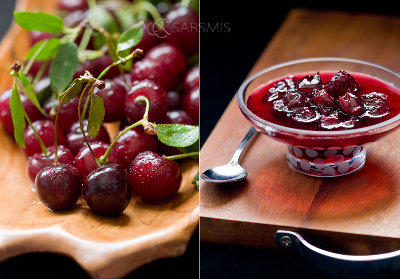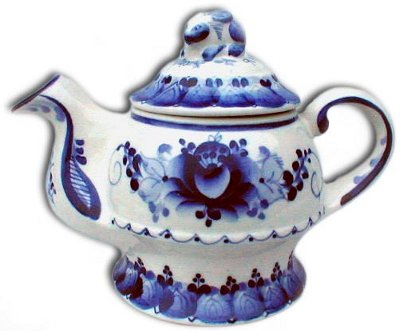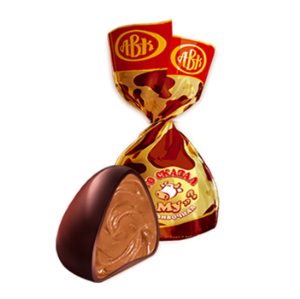Categories: "Food"
Варенье
The Russian word варенье is used to identify a type of thick, sweet, conserved fruit or berry syrup. It is not exactly a jam, but more like a preserve. Berries and fruits are boiled in water with a lot of sugar until everything becomes thick and heavy. In fact, the word comes from the Russian варить (to boil) and can be confused with варение (the process of boiling something).
You can assuredly say that варенье is a part of the Russian cuisine and culture just like pelmeni, borscht and vodka are. Russian summers are brief and winters can get a little long, so people put up perishable fruits and berries for the cold days by preserving them. It has always been the most common type of dessert on the table and one of the essential innards of every home’s kitchen cabinet, especially if there are children. Most mothers and grandmothers have their own recipes with special ingredients that usually make homemade варенье taste far superior to whatever might be found on the supermarket shelf.
 Варенье made from cherries. Image from sarsmis.livejournal.com.
Варенье made from cherries. Image from sarsmis.livejournal.com.
Here are some example sentences:
| Мне больше всего нравится варенье из черной смородины. | My favorite preserve is black currant. |
| Завтра бабушка будет варить много варенья на зиму. | Tomorrow grandma will boil a lot of preserves for the winter. |
| Карлсон, который живет на крыше, очень любит варенье. | Carlson who lives on the roof loves preserves very much. |
| Не ешь клубничное варенье, а то у тебя будет диабет. | Don't eat strawberry preserve, or you’ll have diabetes. |
Чайник (часть первая)
The Russians word for a teakettle is чайник; it comes from the word чай (tea). The teakettle is used to heat up water for the tea, while the заварной чайник (teapot) refers to the vessel in which the actual tea is served. Today, many households also have the электрический чайник (electric teakettle). Russians commonly say чайник when talking about either one of the three, but fortunately that rarely causes confusion.
| Sg | Pl | |
| Nom | чайник | чайники |
| Acc | ||
| Gen | чайника | чайников |
| Pre | чайнике | чайниках |
| Dat | чайнику | чайникам |
| Ins | чайником | чайниками |
 image from goldmoscow.com
image from goldmoscow.comHere are a few example sentences:
| Слышишь? Чайник уже закипает, иди скорей на кухню и убери его с плиты. | You hear that? The teakettle is beginning to boil, hurry to the kitchen and remove it from the stove. |
| Мне подарили очень дорогой фарфоровый чайник, который я теперь использую только для лучших сортов японского и цейлонского чая. | As a present, I received a very expensive porcelain teapot which I now only use for the best Japanese and Ceylon teas. |
| Георгий случайно уронил поднос с завтраком, и полный, горячий чайник разбился вдребезги. | George accidentally dropped the breakfast tray and a full, hot teapot broke into tiny pieces. |
| Нам надо купить новый чайник, потому что этот уже заржавел. | We need to buy a new teakettle because this one has gotten too rusty. |
The word чайник can also be used as an insult when directed at someone who the offender considers to be a bit irrational and obtuse:
| Какой же ты чайник, ни одну математиматическую задачу на экзамене не решил. | What an airhead you are. You didn’t even solve one math problem on the exam. |
Тарелка
The word тарелка is translated as plate. For the most part, it is a kitchen term, but can also be used to describe a UFO saucer (летающая тарелка), a satellite dish (спутниковая тарелка), or the percussion instrument cymbal.
| Sg | Pl | |
| Nom | тарелка | тарелки |
| Acc | тарелку | |
| Gen | тарелки | тарелок |
| Pre | тарелке | тарелках |
| Dat | тарелкам | |
| Ins | тарелкой | тарелками |
Here are some sample sentences:
| Папа разбил три тарелки, пока готовил обед. | Dad broke three plates while cooking dinner. |
| Фарфоровая тарелка ручной работы может дорого стоить в их магазине. | A hand made porcelain plate can cost a lot of money at their store. |
| Барабанщик, как же ты будешь сегодня играть без тарелок? Иди скорей и попроси их у кого-нибудь занять на пару песен. | Drummer, how are you going to play without the cymbals? Hurry up and ask someone to let you borrow them for a couple of songs. |
| Oдин раз кто-то мне просто так вылил на голову тарелку борща. | One time someone poured a plate of borsch on my head for no apparent reason. |
The translation of that last sentence sounds very odd to the American ear: after all, no one would ever serve you soup on a plate because a plate is mostly flat and the soup would run off! But in Russian тарелка includes dishes that are deep enough to be called bowls in American English. You'll still find “plate of soup” in older English translations of Russian literature, but if the target audience of your translation is American, then the better translation is “bowl.” Take a look:
 Image taken from vkusnosti.com
Image taken from vkusnosti.comHere's a short, connected dialog that shows you not only the word тарелка, but also has some good vocabulary you'll encounter generally while shoppping.
| — Простите, девушка, почём вот эти тарелки? | “Excuse me, Miss, how much are these plates?” |
| — По шестьсот рублей. Hо могу сделать вам скидку, если купите шесть или больше. | “Six hundred rubles each. But I can give you a discount if you buy six or more.” |
| — Cколько? | “How much?” |
| — Hу, например пятьсот двадцать за каждую. Тарелки из Санкт-Петербурга, так что дешевле вы нигде не найдёте. | “Well, for example five hundred and twenty per each. The plates are from St. Petersburg so you won’t find them cheaper anywhere else. |
| — Ладно, возьму! | “Ok, I’ll take them!” |
| — Oтлично, с вас пожалуйста три тысячи пятьсот рублей. | “Great, it’s three thousand five hundred rubles please.” |
| — Вот. | “Here.” |
| — Большое спасибо, приходите ещё. | “Thank you very much, come again.” |
Конфеты (часть вторая)
The generic Russian word for a piece of candy is конфета:
| Sg | Pl | |
| Nom | конфета | конфеты |
| Acc | конфету | конфеты |
| Gen | конфеты | конфет |
| Pre | конфете | конфетах |
| Dat | конфете | конфетам |
| Ins | конфетой | конфетами |
Bear in mind that in English the word candy is a mass noun, one which is mostly used in the singular to indicate indefinite quantities of candy. In that sense the Russians use конфеты in the plural. When discussing a single piece of candy, they use the singular:
| — Ты любишь конфеты? — Ещё бы! |
“Do you like candy?” “And how!” |
| — Не хочешь конфету? — Пожалуйста. |
“Do you want a piece of candy?” “Yes, please.” |
| Не люблю сладкого. Могу совсем спокойно жить без конфет. | I don't like sweet stuff. I can live perfectly happily without candy. |
| Я хотел поесть сладкого, но в киоске не было ни одной конфеты. | I wanted to have a little something sweet to eat, but the kiosk didn't have a single piece of candy. |
The candy in Russia is simply wonderful. It's worth paying for a year of studying abroad just to go there and explore the enormous variety of tooth-rotting confections. And the names of some of the candies will bring a smile or smirk to the face of us Americans. Here are some of the ones that have brought a smile to my face:
| Детский музыкальный театр | Children's musical theater |
| Ласточки | Swallows |
| Кто сказал му? | Who said “moo”? |
| Славянский простор | Slavic expanse |
One of my former students was recently in Russia and sent me the following blurb about the candy she had been buying in Russia:
В магазине «Сахарный Лев»:
- Конфеты «Парижель» — Made by the Ukrainian фабрика «АВК». Тhese are probably the best chocolates I've ever had. They're about 60% of the price of similar candies, which I'm thinking has something to do with the cost of labor in Ukraine. Весовые, 194,20 рублей/кг (280 grams, about 15 candies, for 54,38 rubles.)
- «Бабаевский» шоколад с кусочками вишни, 1 штука, 100г, 46,60 рублей
Here are some great descriptions for various Russian candies:
| Candy names | Link |
| Pigeon-toed Mikey Squirrel Mikey in the North Sunflower Kozinak |
Click here |
| Here, Kitty Kitty Slavic Expanse Ryskie Optima |
Click here |
| Spartak Elite Dark Bitter Aerated Chocolate | Click here |
| Little Cow Bird’s Enjoyment Heavenly Song |
Click here |

“Who said moo” candy
Лимонад

An English speaker might assume that лимонад means lemonade, but in Russian it means almost any non-alcoholic beverage, usually carbonated, and usually sweetened with fruit or berry syrup or sometimes with various herbs or artificial flavors. In other words, it means soft drink. That's right: in Russian both Пепси-Кола and Кока-Кола are лимонад.
In Russia there are many лимонады that we Westerners usually don't encounter in the US. For instance:
| Name | Flavoring |
| Байкал | St. John's wort and licorice |
| Ситро | Various citrus flavorings |
| Бионад | Various flavors (even leechee) |
Probably the scariest one of them all is Тархун, pictured to the right, which is flavored with dragon's wort. Its green coloring makes it look like an industrial-sized bottle of Nyquil, and its flavor is somewhere between vile and repulsive.
Here are some sample sentences:
| — Какой ты хочешь лимонад? — Фанту. |
“What soft drink do you want?” “Fanta.” |
| Ой, у нас кончился лимонад. Придётся зайти в магазин. | Oh, no, we've run out of soft drinks. We'll have to run to the store. |
| Мама спрятала шоколадку в холодильнике за лимонадом. | Mom hid the chocolate bar in the refrigerator behind the soft drinks. |
| Хотя это плохо для здоровья, я не могу обходиться без лимонада. | Although it's bad for the health, I just can't do without soft drinks. |